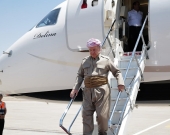Decline in Kurdish Language Use at Home Among Turkey's Kurds, Study Finds

A recent study by the Socio-Political Field Research Center has highlighted a significant decline in the use of the Kurdish language at home among Turkey's Kurdish population. The survey, conducted earlier this month among 1,276 individuals across 16 provinces, including those with Kurdish-majority populations, reveals that only 42.2 percent of Kurds regularly speak Kurdish at home.
The findings show a gender disparity in language use, with 46.3 percent of men and only 35.9 percent of women using Kurdish at home. The study also notes an age-related trend, with the highest usage recorded among those over 65.
The survey indicates that 18.8 percent of Kurdish families speak only Turkish at home, and 46 percent use both Kurdish and Turkish. Overall, 64.8 percent of participants primarily communicate in Turkish at home.
A worrying trend is seen in the younger generation's language proficiency. Nearly 40 percent of children aged 12 to 17 are unable to speak Kurdish, and another 25 percent have very limited knowledge of the language.
Despite these challenges, there is a strong desire among the Kurdish community to preserve their mother tongue. Nearly all respondents, 99.4 percent, expressed the wish to protect and develop the Kurdish language, with 98.4 percent wanting their children to receive education in Kurdish.
Participants identified the main threats to the Kurdish language as the lack of educational opportunities in Kurdish, families speaking Turkish to their children, and government policies perceived as oppressive and assimilatory towards Kurdish culture. Many respondents reported experiencing discrimination due to their use of a non-Turkish language, particularly in government institutions.
To address these issues, the study suggests several measures to revitalize Kurdish, including making it a language of education (36.1 percent), providing legal protections (29.6 percent), and granting it official language status (16.5 percent). Additionally, 12.5 percent believe that families should actively teach Kurdish to their children.
Although the Kurdish language is no longer banned in Turkey, Turkish remains the sole official language of education and government institutions. Following the local elections in March, the pro-Kurdish Peoples' Equality and Democracy Party (DEM Party), which won the majority of municipalities in Kurdish areas, initiated efforts to promote Kurdish and other non-Turkish languages through cultural events, such as street festivals.
In April, Diyarbakir (Amed in Kurdish) hosted its ninth annual theatre festival, featuring 14 productions in Kurdish and five in Turkish, showcasing the rich cultural heritage of the Kurdish language.
Historically, the Kurdish language faced severe restrictions, especially throughout the 20th century after the establishment of Turkey's modern state in the 1920s. Public use of Kurdish was banned, including speaking, publishing, and singing in the language. Turkey's current constitution, adopted after the 1980 military coup, recognizes Turkish as the country's only official language, although it does not entirely prohibit the use of Kurdish. However, successive governments have imposed stringent restrictions on its use.
The study underscores the critical need for policy changes and community efforts to ensure the preservation and growth of the Kurdish language in Turkey.












